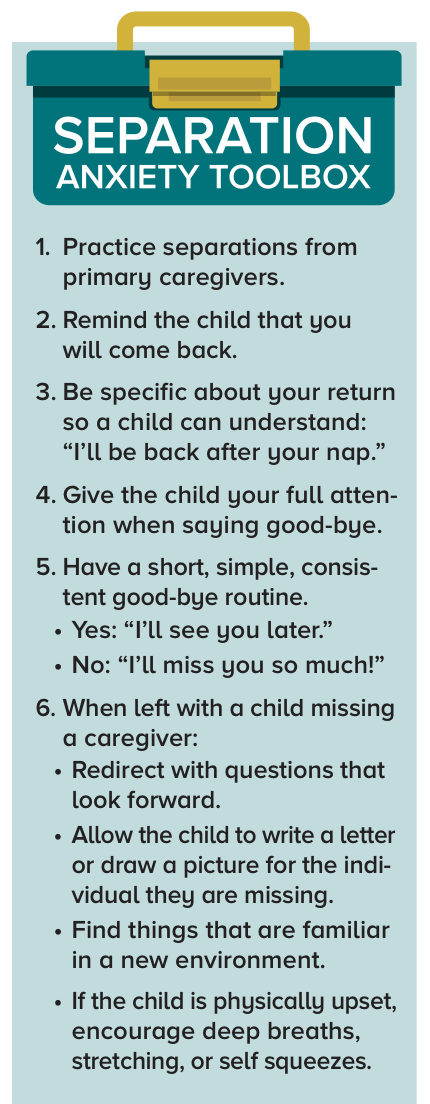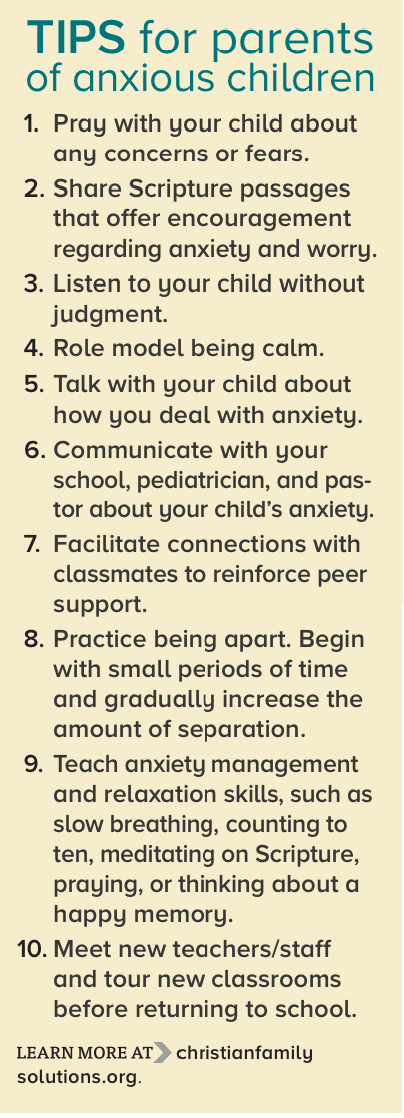 |
My kids and I have spent almost no time apart since mid-March. With school starting soon, I’m a little nervous about how my youngest, who is six, is going to handle the separation. Are you running into this issue with your kids? If so, you will find great tips from this month’s authors, including ideas on how to help alleviate any type of anxiety. Try them out and let me know what works best for your family.
— Nicole Balza
WHEN I FIRST was asked to write about separation anxiety, I immediately thought of my three-year-old, whom I refer to as my barnacle. She clings to me at all times. In fact, if I close the bathroom door for some privacy she usually sits outside and cries or repeatedly asks how long I will be in there.
Our family has been around each other a lot more lately due to the present global pandemic. My girls are with me as we attempt homeschooling, and my husband has been doing a majority of his work from home. Through all this, my barnacle has started to latch on to me even more than normal, to the point that she won’t even go to her father at times. So I thought, Easy peasy, I’ve got this article down. It’s every day of my life with my three-year-old.
Unexpected anxiety
My husband is a social worker who works with homeless veterans, so there is a point each week when he has to leave his garage office to check in on his clients. There is usually a cheerful good-bye from my daughters and me because we know he will only be gone for two to three hours. My barnacle is content that she can continue to cling to me, and my six-year-old knows there is definitely more screen time and junk food when her father is gone.
One morning recently, though, my six-year-old daughter was angry and cranky when he left. She continued to take out her frustration on her sister and me. After a few back-and-forth exchanges, I finally snapped at her and asked, “Why are you so cranky?”
She simply responded, “I don’t want Daddy to leave.”
Confused, I looked at her and said, “Why? He’s just going to work like usual.”
She burst into tears and said, ”I don’t want him to leave the house because they are hurting Black men like him right now.”
I burst into tears with her.
God’s comfort
This was not the regular separation anxiety I faced daily with my barnacle. For my daughter, this was real fear and anxiety that she would never see her dad again. We did all the normal things that I would do when separation anxiety creeps up. We took deep breaths, we did some stretches, and we wrote Daddy a note and drew him a picture to tell him how much we love him. She needed more, so we dove into Scripture. I typed “anxiety” into my Bible app and came up with Philippians 4:6,7: “Do not be anxious about anything, but in every situation, by prayer and petition, with thanksgiving, present your requests to God. And the peace of God, which transcends all understanding, will guard your hearts and your minds in Christ Jesus.”
I read this to myself, then read it to her. I said, “I think we should pray.” I started a simple prayer, and my daughter soon took over, sharing her worries and fears with Jesus. I can’t tell you exactly what she said because I was so busy watching her body language as her body started to relax. You could see the anxiety and the fear dissipate. In that moment we could have tried all of my calming techniques for anxiety, but what she needed to do was cast her anxieties on Jesus and have the reassurance that he was watching over her—and her daddy too.
Meg Clemons-Smith
TOM AND CARRIE WERE EXASPERATED. It was Monday morning, and once again, their eight-year-old daughter, Emily, was crying and begging to stay home from school because she felt sick. No amount of talking, coaxing, or reassuring helped. In desperation, they scheduled an appointment with Emily’s pediatrician. After a thorough examination, the doctor explained that Emily was experiencing Separation Anxiety Disorder and referred her to a counselor.
Separation Anxiety Disorder may involve symptoms that are persistent, excessive, and intense. These symptoms often lead to major distress in family relationships, friendships, and school attendance.
Some of the potential symptoms of Separation Anxiety Disorder include
- high anxiety, even misery, when separating from a major caregiver;
- worry about losing a caregiver;
- whining, crying, begging, or tantrums when facing separation;
- being afraid to sleep alone or without the caregiver; and
- frequent complaints about headaches, stomachaches, nausea when separated or when separation is anticipated.
Separation Anxiety Disorder often develops after a stressful life event. However, sometimes there is no identifiable trigger. Genetics also appears to play a role, as anxiety tends to run in families. Parents who are overly protective may unintentionally contribute to their child’s worry and fear.
About 4 to 5 percent of American children ages 7 to 11 experience Separation Anxiety Disorder, as well as approximately 1 percent of teens. Boys and girls are equally impacted.
As is true with so many issues, early intervention can help to alleviate problems before they become bigger issues. Without treatment, children are at greater risk of depression, anxiety disorders, school avoidance, academic underachievement, low self-esteem, and strained relationships with family and peers.
Effective treatments are available that can help to bring relief, often in a short period of time. These treatments may include a combination of
- individual counseling, which helps the child to modify fearful thoughts and face fears;
- professional Christian counseling and/or pastoral counseling that incorporates reflection on Scripture passages about worry, anxiety, peace, and trusting God;
- family therapy that includes parent education;
• consultation with the school; and - medication for moderate to severe cases.
After a few counseling sessions, Emily was feeling far less anxious and was going to school regularly. She learned strategies to calm her mind and body. Her favorites were deep breathing and meditating on Philippians 4:13, “I can do all this through him who gives me strength.”
Sheryl Cowling
Authors: Multiple authors
Volume 107, Number 09
Issue: September 2020
- Parent conversations: How can parents and kids manage stress?
- Parent conversations: What do your prayers for your children include?
- Parent conversations: How should I handle a child’s separation anxiety?
- Parent conversations: How do we resist making our parenting law-based?
- Parent conversations: What Bible passages do you turn to most as a parent?









